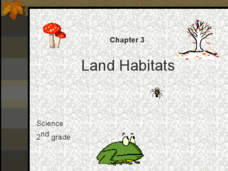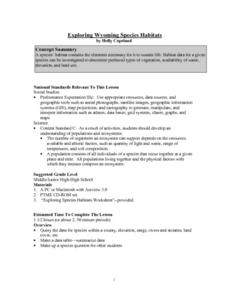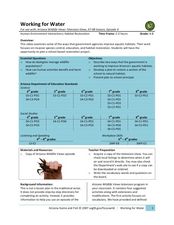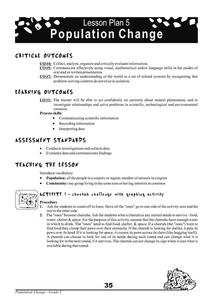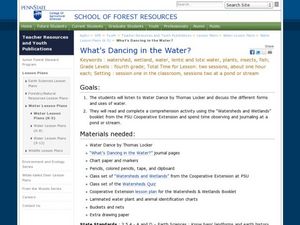Curated OER
What Is in the Water?
Students compare bottled water qualities to water found naturally in a pond habitat. They research their state's laws/regulations in regard to bottled water and study the advertising, cost, and quality of brands of bottled water. They...
Purdue University
Healthy Water, Happy Home
Clear water does not mean clean water. A collaborative lesson has groups play a board game to identify sources of water pollution and develop strategies for improving water quality. Their investigations include reference to the water...
Curated OER
Water Around Us
Students create a collage of human land use activities around a body of water. Students evaluate the effects of different kinds of land use on wetland habitats, and create a list of pros and cons for each land use.
Curated OER
Land Habitats: Grade 3 Science
Build your students scientific vocabulary with this slide show on land habitats. Each slide provides a vocabulary word, image, and definition of a term common to habitats and the environment. Great for science class or as comprehensible...
Marine Institute
Water Pollution
Sixth graders investigate the various types of pollutants found in water and ways to help prevent water pollution. Through a hands-on experiment, students create samples of polluted water by mixing water with vegetable oil, dirt,...
Curated OER
Exploring Wyoming Species Habitats
Middle schoolers are introduced to the concept of species habitats and ranges. They introduced to ArcView GIS as a tool for mapping. Pupils use query data for species withina county, elevation, range, rivers and streams, land cover, and...
Curated OER
Animal Habitats
Learners research an animal and their habitat. In this animal habitat instructional activity, students observe a WebQuest that describes the different habitats: deserts, tundra, rainforest, forest, and ocean. They determine which habitat...
Curated OER
Animal and Plant Habitats
Second graders write and illustrate a story. For this habitats lesson, 2nd graders learn about different types of plant and animal habitats. Students view video segments about habitats, answer comprehension questions, complete a...
Curated OER
Learning About Animal Shelters for Earth Day
Students explore habitats. in this ecology and animal habitat lesson, students listen to the book A House is a House for Me by Mary Ann Hoberman. Students discuss the basic needs of animals and go on a nature walk to observe animal...
Curated OER
Ocean Habitats
Students examine the water samples from a demonstration and discuss the difference between fresh and salt water. They draw different animals that live near or in the ocean and how humans can harm the ocean habitat. They draw pictures of...
Curated OER
Regents High School Exam: Living Environment 2008
Tne New York Regents High School Examinations are comprehensive and include various styles of questions, includingmultiple choice and the analysis of graphs. This particular version, the 2008 Living Environment exam surveys a variety of...
Curated OER
Working for Water
Students examine the ways that government works to help improve aquatic habitats. In this water habitats lesson plan students view a video and plan a school restoration project.
Curated OER
The Chesapeake Bay in Captain John Smith's Time
When Captain John Smith visited the Chesapeake Bay in the summer of 1608, what types of animals and habitats did he encounter? Your young historians will analyze primary source documents to answer this question, as well as compare...
Curated OER
Dream Stream
Investigate the parts of a healthy stream to build content-specific vocabulary and ecological awareness. The class builds vocabulary and determines why clean water is important for trout. They design a shoe box to show what a clean...
Curated OER
Habitats of the World
Students discover that the Earth supports many different animal habitats. In this habitat lesson students research different habitats of the world. Students show how the animals in their habitat are adapted.
Cheetah Outreach
Population Change
Your youngsters become cheetahs in search of food, water, shelter, and space in a fun physical game that does a fantastic job of representing fluctuating species population based on resources available over years.
ARKive
Adaptations to Arid Habitats
How do plants and animals survive in habitats with very little water? Explore arid ecosystems and the way their inhabitants have adapted with a instructional activity and science experiment. After kids listen to a presentation about...
National Park Service
Weather Patterns of the Pacific Ocean
How do oceans affect weather patterns? Learners define vocabulary associated with dew point, topographical lifting, condensation, and formation of clouds and precipitation as they explore the weather in the Pacific Northwest. They also...
Curated OER
What's Dancing in the Water?
Students learn about watershed, as well as the different forms and uses of water. In this water forms instructional activity, students brainstorm water sources and uses. Students read the book Water Dance and discuss water examples....
Curated OER
Marine & Aquatic Habitats Activities - Terrestrial Forests vs. Kelp Forests
Students discuss concept and specificity of habitats, both marine and terrestrial, list similarities and differences in the habitats of a kelp forest and a terrestrial forest, compare types of organisms that occupy corresponding types of...
Curated OER
Art: Drawing Ducks in Their Natural Habitats
Sixth graders explore various waterfowl species and discover how duck stamps are used. After researching specific types of birds for a stamp competition, they draw the birds in various natural settings. Before sending the submissions,...
Curated OER
Habitats
First graders investigate animal habitats. In this habitats lesson, 1st graders visit the woods to identify examples of food, water, and shelter that animals use to survive. Students complete a worksheet.
Curated OER
Animal Habitats Cut and Paste
In this animal homes worksheet, students cut out 6 pictures of animals and paste them under the appropriate habitat: water or land.
Curated OER
Habitats of the Pond
Students explore biology by researching habitats for organisms. In this water environment lesson, students utilize a magnifying glass to examine the different organisms that live on a nearby pond or lake and explore their habitats....
Other popular searches
- Animals Water Habitats
- Animal Water Habitats
- Land or Water Habitats
- Shallow Water Habitats
- Water Habitats Lesson Plans
- Describe Water Habitats
- Water Habitats Rivers





